Research Papers/Articles
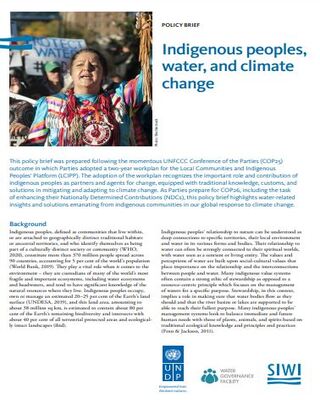
Indigenous People, Water, and Climate Change
2020
Author(s): Stockholm International Water Institute
This policy brief was prepared following the momentous UNFCCC Conference of the Parties (COP25) outcome in which Parties adopted a two-year workplan for the Local Communities and Indigenous Peoples’ Platform (LCIPP). The adoption of the workplan recognizes the important role and contribution of indigenous peoples as partners and agents for change, equipped with traditional knowledge, customs, and solutions in mitigating and adapting to climate change. As Parties prepare for COP26 including the task of enhancing their Nationally Determined Contributions (NDCs), this policy brief highlights water-related insights and solutions emanating from indigenous communities in our global response to climate change.
To assist MGNREGS to amplify the climate resilience impacts of its work, IIED in partnership with Madhya Pradesh Council of Science & Technology (MPCST) co-developed the Climate Resilience Information System and Planning Tool for MGNREGS (CRISP-M). A top-down and bottom-up approach to help communities make climate-smart decisions and enable them to absorb the effects of climate risks, adapt to climate impacts, and transform their capacities to deal with growing climate impacts.
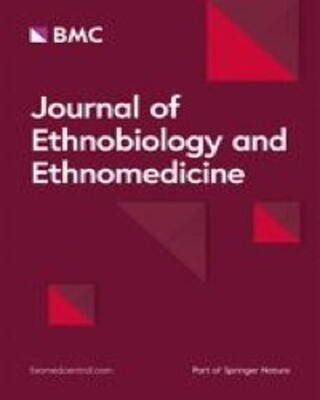
Plants for Making Wooden Bowls and Related Traditional Knowledge in the Gyirong Valley, Tibet, China
2022
Author(s): Ding XY, Guo CA, Hu HB, Wang YH
This study utilized a use-report (UR) to reflect the number of mentions of a species by locals. Between 2019 and 2021, key informant interviews, semi-structured interviews, and participatory observations were used to conduct ethnobotanical field surveys in Gyirong Valley. The field work was performed with the assistance of local guides.
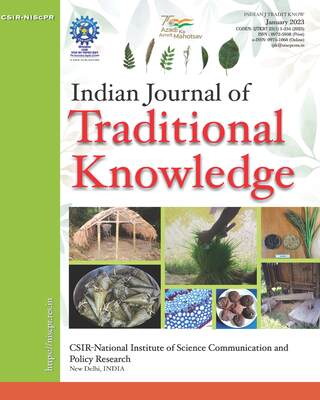
Traditional Meliponiculture by Naga tribes in Nagaland, India
2016
Author(s): Singh AK
In Nagaland, three species (Tetragonula irridipenis, Tetragonula laviceps and Lophotrigona canifrons) of stingless bees were observed; however, most of the beekeepers were rearing T. irridipenis. Stingless bees were found to prefer low light, high humidity, and stenothermal climatic conditions with diverse abundant flora. The traditional colony capture method of terrestrial and subterranean stingless bee was logical and practical and shows immense scope to introduce precise method with scientific interventions.
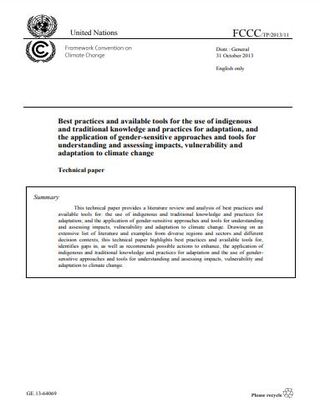
Best Practices and Available Tools for the Use of Indigenous & Traditional Knowledge & Practices for Adaptation & the Application of Gender-Sensitive Approaches & Tools for Understanding & Assessing Impacts, Vulnerability and Adaptation to Climate Change
2013
Author(s): United Nations Framework Convention on Climate Change
Based on an extensive review of relevant information and literature, this technical paper presents a review of best practices and available tools for the use of indigenous and traditional knowledge and practices for adaptation, and the application of gender-sensitive approaches and tools for understanding and assessing impacts, vulnerability and adaptation to climate change.
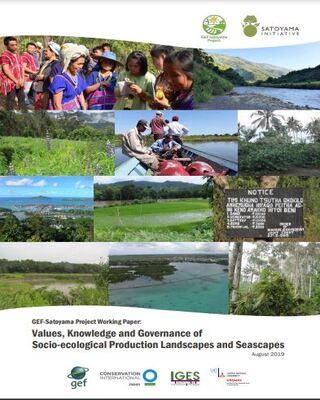
Values, Knowledge and Governance of Socio-Ecological Production Landscapes and Seascapes
2019
Author(s): Takahashi Y, Lopez-Casero F, Natori Y, Dublin D
This publication aims at compiling and disseminating good practices and lessons learnt from the outcomes of the GEF-Satoyama Project, which supported on-the-ground demonstration of sustainable management of socio-ecological production landscapes and seascapes (SEPLS) in ten countries in three biodiversity hotspots.
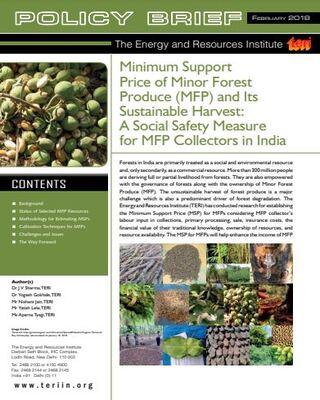
Minimum Support Price of Minor Forest Produce (MFP) and its sustainable harvest: a social safety measure for MFP collectors in India
2018
Author(s): Sharma JV, Yogesh Gokhale Y, Jain N, Lele Y, Tyagi A
The implementation of MSP will help in sustainable forest management, sustaining livelihood of MFP collectors, mitigating climate change, contributing towards Nationally Determined Contributions (NDCs) targets from the forestry sector, and improving the quality of forests.
Indigenous Agroforestry Practices by Orang Asli in Peninsular Malaysia: Management, Sustainability and Contribution to household economy
2017
Author(s): Keat NJ, Nath TK, Jose S
This study examined the indigenous management and sustainability of agroforestry practices, constraints experienced and contribution to household income. Data were collected from two Orang Asli villages practicing forest-garden agroforestry (FAF) and home garden agroforestry (HAF).
Zootherapeutic Uses of Animals by Mech Tribe Living in Duars of West Bengal, India
2014
Author(s): Sarkar A, Biswa R, Das AP
The paper discussed the study carried out among the Mech tribe living in the Duars of West Bengal, India. The study recorded the uses of 20 different species of animals along with 11 species of plants in traditional medicines to cure different ailments.
Documentation of traditional medicinal plants use in Ensaro District, Ethiopia: Implications for plant biodiversity and indigenous knowledge conservation
2023
Author(s): Asfaw A, Lulekal E, Bekele T, Debella A, Abebe A, Degu S
This study was conducted in Ensaro District in Ethiopia to identify medicinal plant species used by the local community to treat various human ailments. A total of 389 informants (283 males and 106 women) were chosen to collect ethnobotanical data. Semi-structured interviews, participant observation, guided field walks, and focus group discussions were used to collect ethnobotanical data.



